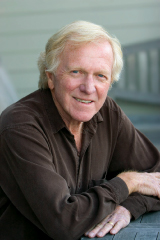“Tragic Story Continues,” read the headline in the Marin I.J. on July 28. The accompanying article referred to the May 2009 death of nine-year-old Melody Osheroff, who was struck down in a Novato crosswalk by a drunken motorcycle driver. The story’s latest chapter occurred on July 26, when that driver, Edward Schaefer, 44, was stabbed to death by a fellow inmate at San Quentin State Prison, where he had been sent 10 days earlier on a conviction of second-degree murder.
Schaefer, who had several previous DUI convictions, had a blood alcohol level twice the legal limit when he ran a stop sign at 60 mph and struck Melody and her father, Aaron Osheroff, 41. It was dusk and the father and daughter never knew what hit them. “All I
recall,” says Osheroff, “was a lady standing over me asking, ‘May I pray for you?’” The impact mangled Osheroff’s legs. One has been amputated; the other will never be normal.
In a recent interview, I asked Osheroff how he felt when informed his daughter’s murderer had been murdered in prison. “I thought spending most of his remaining years in prison was going to be Schaefer’s retribution—I just think he got off easy,” he told me.
So does death qualify as “getting off easy”? Osheroff’s answer was yes: he believed it would have been harder for Schaefer to live out his life in prison than to have been murdered. “My wife, Kimberly, and I don’t in any way condone his murder in prison,” he says. “However, I know what it’s like to nearly die. I had lost my daughter and effectively the use of my legs. In the hospital, I was in pain—both physical and emotional pain. Now I have much to live for … my wife, eight-year-old daughter, and myself, too. But I’ve been in a place where I learned that to go on, to live, can be more difficult than slipping away.” Osheroff’s summary thought on this matter: “Yes, it can be harder to live than to die.”
I asked why he wanted his daughter’s murderer to live, rather than die. Was it that Schaefer’s feelings of guilt would slowly drive him mad? “No,” Osheroff said, “I don’t think he had a conscience, especially not when drinking which, apparently, was much of the time.” He wanted Schaefer to live in prison as punishment. “I wanted him to be denied his freedoms, his ability to ride his Harley and drink his drinks, whatever he drank.”
Will Osheroff ever be able to forgive Schaefer for the recklessness that resulted in his daughter’s death? “I understand forgiveness,” Osheroff said, “but I wanted him to pay for what he did … I really don’t know if that is vengeance.”
As we talked about forgiveness, Osheroff brought up Eva Kor, an Auschwitz survivor who said she forgave the Nazis for the horror they inflicted on her and others. “I do understand forgiving is for yourself,” Osheroff said, “not the other person.” He recognizes the other person does not have to be aware that he or she has been forgiven and, that, in his case, the person is no longer living. “I’m trying to be the best person I can be,” Osheroff said, “and maybe sometime I’ll be able to explore forgiving. Believe me, I’m leaving that door open, but I don’t know if I ever can.”
What Osheroff wants for now is “to stop thinking about Edward Schaefer. He is not here anymore. I want to stop thinking about him.”
This is where Osheroff appears conflicted. His insurance has covered and will continue to cover all his medical expenses, but he and his wife have filed a wrongful death lawsuit against Schaefer, his mother, her business and the city of Novato, alleging negligence.
The Osheroffs filed the suit after Schaefer’s conviction—in which the judge also ordered Schaefer to pay $1.8 million in restitution—but before Schaefer’s prison yard murder. “Believe me, we thought long and hard before filing that lawsuit,” Osheroff said.
Some observers of the story say the lawsuit is justified, that many were negligent in the tragedy. Others say the Novato police, fire and civic personnel who helped the Osheroffs in their time of need may ironically lose their jobs if the city, already in dire financial straits, becomes enmeshed in a costly lawsuit.
I say now is time for the Osheroffs to begin “to explore forgiving,” and a giant—and extremely difficult—first step would be to drop their lawsuit. An extended and costly legal battle will only serve to prolong the agony for everyone involved in this dreadful tragedy. That’s my point of view. What is yours?
E-mail [email protected].


